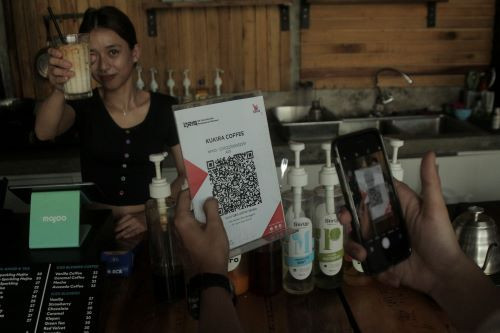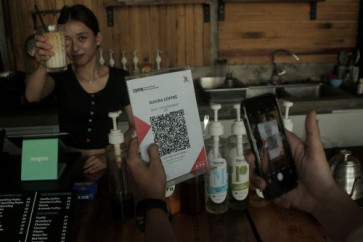Popular Reads
Top Results
Can't find what you're looking for?
View all search resultsPopular Reads
Top Results
Can't find what you're looking for?
View all search resultsThe convenience of financial transactions at your fingertips
The government must ensure that robust internet connectivity is accessible in all remote areas in Indonesia to successfully implement the digital transformation.
Change text size
Gift Premium Articles
to Anyone
A
nother challenging day lies ahead for Susi, a woman who lives in a remote area of Indonesia, as she copes with complexities in managing her monthly outstanding bills. Receiving the funds sent on a monthly basis by her husband (who is currently employed in the capital city) through bank transfer, poses a challenge for Susi due to her remote location and the limited withdrawal options available.
For quite some time now, Susi has made it a monthly routine to leave her small village and travel to a bigger town to access the closest ATM. The routine required her to dig deep into her pocket due to the high costs of transportation.
Many Indonesians living in rural areas may relate to Susi's tale and the struggles she encounters. Geographical barriers hinder individuals’ access to formal banking and financial services which eventually force them to rely on informal financial channels and remain unbanked, a condition in which people do not have bank accounts at all.
The World Bank report published in 2022 showed a significant portion of the adult population in Indonesia, approximately 97 million adults, or 48 percent, remained unbanked. This makes Indonesia a country with the highest number of unbanked individuals globally. However, according to a survey conducted by the Indonesian Internet Service Providers Association, the number of internet users in Indonesia during the 2022-2023 period reached 215.63 million people, which accounts roughly for 78.19 percent of the country's total population of 275.77 million people.
Given Indonesia’s large unbanked population and the widespread use of the internet in Indonesia, financial technology products such as digital wallets still have considerable room to grow. A digital wallet, also known as an e-wallet or mobile wallet, is a software-based system that provides a wide range of financial services, including basic banking services such as money transfers, bill payments and savings, as well as insurance and investment options.
In addition, digital wallets perfectly align with Bank Indonesia's vision of promoting a cashless society through its National Non-Cash Movement. The campaign, initiated in 2014, raises public awareness regarding the usage of non-cash instruments.
TCASH, launched by Telkomsel, one of Indonesia's largest telecommunications companies, was the pioneer of digital wallets in Indonesia, making its debut in 2014. Since then, numerous other digital wallets have made their way into the Indonesian market. In 2017, a digital wallet called GoPay was established, followed by OVO in 2017, DANA and ShopeePay in 2018, and LinkAja in 2019. As of July 2022, GoPay, OVO, DANA, ShopeePay and LinkAja were the most popular digital wallet applications among consumers in Indonesia, according to Populix.



















